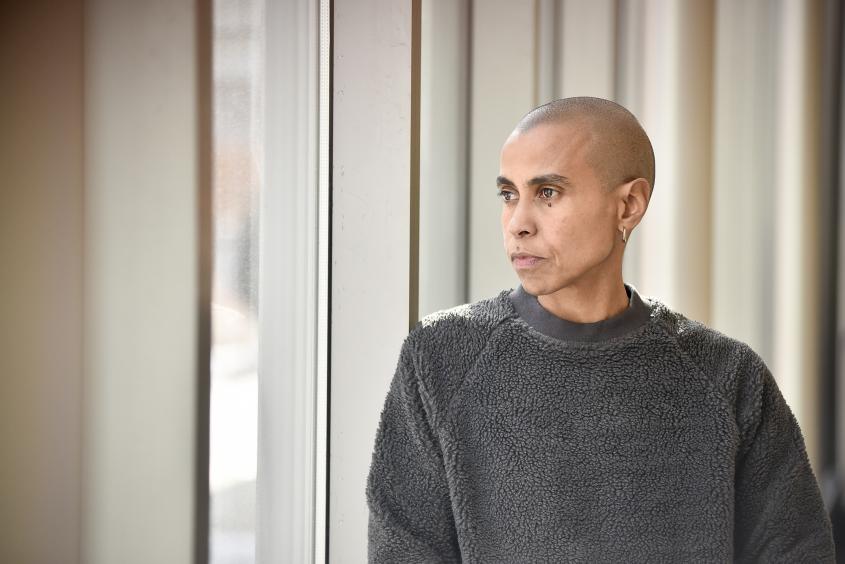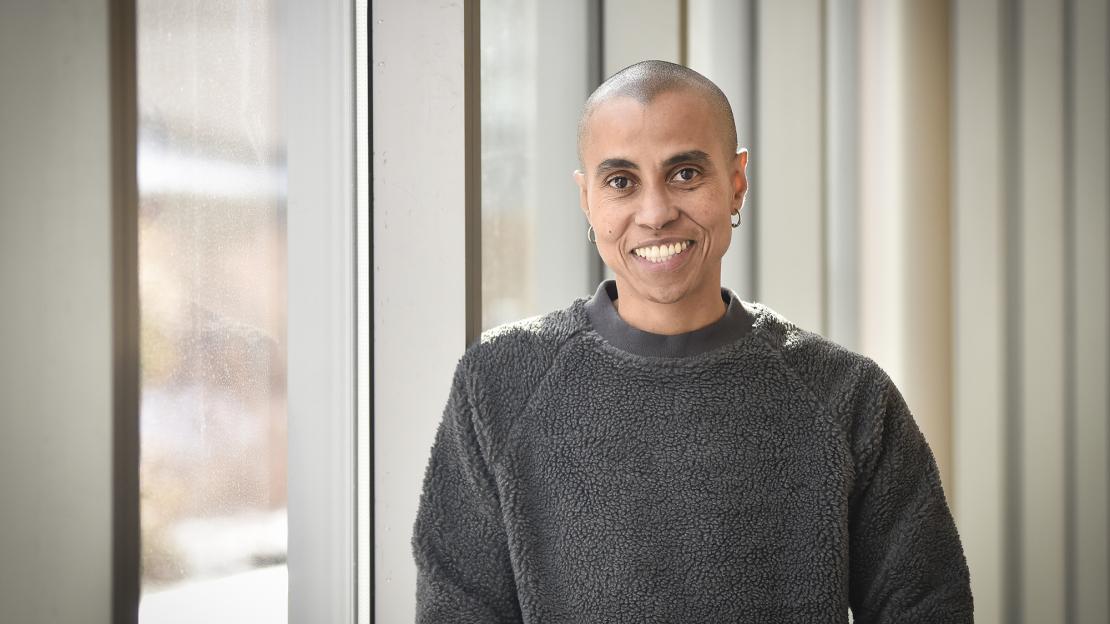Toronto-based artist Michèle Pearson Clarke is U of T Scarborough’s new artist-in-residence.
For Clarke, the opportunity for open and ongoing dialogue with students and faculty is an extension of her artistic practice.
“Being at U of T Scarborough and taking a primarily guest teaching and mentorship role, that to me was the focus of my residency, rather than being in production,” says Clarke. “The relationships, the dialogue – those are the products of this residency.”
Clarke is a Trinidad-born artist who works in photography, filmmaking and video installation art – an art form that brings video technology and installation art together. Her work focuses on longing and loss, mainly as black and black LGBTQ2 people experience it.
“We are confronted with visual representations of black people on a daily basis that are still informed by historical and colonial ideas of who we are and what’s possible for us,” says Clarke. “And on top of that, black people, and particularly black queer people, are always represented as in pain and suffering due to racism or due to racism or homophobia.”
Clarke, who is black and queer, says she works to bring attention to a broad array of issues experienced by black folks using tools gained from her educational background in psychology through her Bachelor of Arts in Psychology at Queen’s University, and her Master of Social Work from U of T.
“Primarily because of my educational background, my interests are focused around supporting people and holding space for things like grief and loneliness, disappointment, isolation and other kinds of pain,” she says.
Clarke’s work has been exhibited and screened across Canada, the United States and Europe. She has also completed residencies at the Intergenerational LGBT Artist Residency (2017), Gallery 44 Centre for Contemporary Photography (2016) and the Independent Imaging Retreat (2016).
She’s also worked as a health educator, including working at Planned Parenthood Toronto visiting group homes, leading after-school programs and giving sexual health talks in schools across the Toronto District School Board. Much of that experience continues to inform her art.

But it was a loss in her family that Clarke says was the true pivot point for her pursuit of a full-time artistic practice.
“After my mother died, my grief experience was dramatic and difficult and that, among many things, propelled me to make a different decision,” says Clarke.
Twelve years after graduating with her MSW, Clarke finished her Master in Fine Art (MFA) with a focus in Documentary Media Studies at Ryerson University, and she now teaches in the same program, mindful that she represents something she didn’t have as a student.
“I didn’t feel that as a black, queer, Caribbean person, that my interests were included – I did not see myself,” she says. “There was not a lot of content in the curriculum that addressed the things I was interested in understanding and developing to build my art practice.”
Clarke’s three-channel video installation, Suck Teeth Compositions (After Rashaad Newsome) is currently on display as part of the Here We Are Here: Black Canadian Contemporary Art exhibit at the Royal Ontario Museum (The ROM). On March 6, Clarke and Media Studies Assistant Professor T.L. Cowan will lead a field trip to the exhibit which explores issues of belonging as it relates to Black Canadians’ presence and history in Canada.
Read more on Clarke’s Suck Teeth Compositions in NOW TORONTO and the Toronto Star
Inspiration for her work comes from everywhere, but she specifically points to the work of black women and queer people who have gone before her and demonstrated that “what we feel, what we think, what we experience, what we know does have value – not just for us, but for others as well.”
“When you’re taught that you are not of value and you are lesser than, it makes for a different kind of work process,” she says. “But there are folks who’ve validated me, given me permission to express to who I am, so now I give myself permission, and I try very much in my practice to give permission to others.”
“When you’re taught that you are not of value and you are lesser than, it makes for a different kind of work process,” she says. “But there are folks who’ve validated me, given me permission to express to who I am, so now I give myself permission and I try very much in my practice to give permission to others.”
Clarke, who officially began her artist-in-residence role in January, has already enjoyed many of the conversations and connections she’s made.
“As an artist, you work a lot by yourself, you’re only accountable to you,” she says. “To spend four months in dialogue with faculty and students is really helpful for me because any conversations we have about the issues I explore in my work is going to expand my own understanding of these concerns.”
Clarke’s residency is part of Equity and Diversity in the Arts (EDA), an initiative from U of T Scarborough’s Department of Arts, Culture and Media. Its mandate is to promote diversity of all kinds, including diversities of race, gender, socio-economic status, sexual orientation or identity, age, ability or disability, religion and aesthetics or traditions of practice.
Faculty members can reach out to Clarke, who looks forward to supporting the department’s activities and initiatives. She is also available to meet by appointment or during office hours in AA-331 and can be reached at michele.clarke@utoronto.ca.
